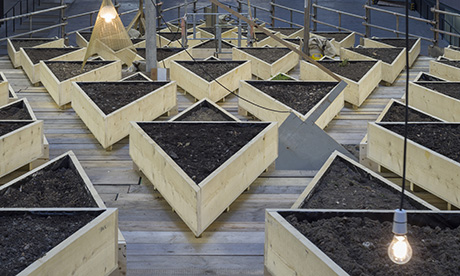Mudern art: tonne of soil from Hackney Marshes transported to Tate

A grower: soil from Hackney Marshes features in the Turbine Hall’s new exhibition. Photograph: Andrew Dunkley ©TATE 2015
A tonne of soil from Hackney Marshes is currently on display at the Tate Modern as part of an intriguing installation by Mexican artist Abraham Cruzvillegas.
Deposited in a labyrinth of triangular-shaped allotments, the soil forms part of the exhibition Empty Lot, which opened earlier this week in the Turbine Hall.
The allotments contain 23 tonnes of soil collected from parks and gardens across London, from the Horniman Museum to Peckham Rye and Buckingham Palace. A tonne of excess topsoil was taken from the East Marsh in Hackney.
But those who enjoy instant gratification are advised to delay a few weeks, for while Cruzvillegas expects “guerrilla gardeners” to throw “seed-bombs” into the compost, he has not planted anything himself.
Tate curators say they do not know what, if anything, will grow.
A gallery spokesperson said: “Cruzvillegas explores ideas of unpredictability and hope, inviting visitors to see the sculpture changing from one week to the next.”
“In the middle of a busy commercial area of London, the ‘empty lot’ is a space where nothing is produced but where change might happen.”
The geometric grid of 240 wooden planters is inspired by ancient Aztec ‘chinampas’ – small grids of earth used to grow vegetables in the area that later became Mexico City.
The soil is lit by lampposts constructed by the artist using materials found in skips and building sites around Tate.
Cruzvillegas, who lives and works in Mexico City, is best known for his continuous project autocontrucción, or self-construction which he describes as “about scarcity, solutions and ingenuity… And how you can conceive a philosophy of life that you can make something out of nothing.”
Cllr Jonathan McShane, Cabinet Member for Health, Social Care and Culture, said the council was “happy to be involved”.
The exhibition can be seen daily for free between 10am and 6pm and until 10pm on Friday and Saturday, until April 2016. For more information, call: 020 7887 8888; visit tate.org.uk
